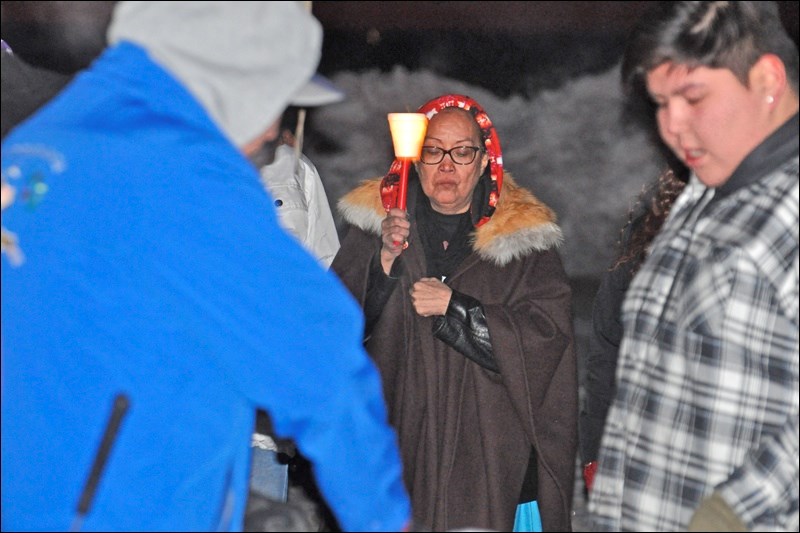The Gerald Stanley trial has been much politicized in the public eye, and the late Colten Boushie’s family recently took a public opportunity to remember the former regional community member as a son, nephew and cousin.
The family hosted an event to memorialize Boushie at the Chapel Gallery in North Battleford on Saturday.
The event began with a pipe ceremony, and later included reflections by Boushie’s family and others involved with the trial, followed by coffee, lunch and a candlelight vigil. Attendees included members of the Baptiste and Boushie families, and some members of the public.
The event took place a year after Stanley was found not guilty of second-degree murder in the death of Boushie.
Some of those who were close to Boushie and who were involved with the trial reflected on the events that have transpired since Boushie was killed.
Local lawyer Eleanore Sunchild said the week had been difficult for the family and her.
Sunchild said much had been made at the trial and in the media about the level of intoxication of the SUV’s driver and passengers.
“I’ve always stood by the point that it’s not abnormal for young people to be out drinking,” Sunchild said, adding that what the SUV passengers were doing wasn’t a good thing, “but that’s just a reality of where we live.”
“It doesn’t mean that a life needed to be taken because of that.”
Sunchild argued the jury should have found Stanley to be guilty of at least manslaughter, given the evidence and the judge’s instructions.
Sunchild made comments critical of the RCMP’s conduct, not limited to their treatment of Debbie Baptiste upon informing Baptiste her son was killed, their handling of evidence, including leaving Boushie’s body and the SUV out in the rain overnight, and showing photos of blood spatter to an expert rather than bringing the expert to the scene. The group has filed a lawsuit against the RCMP, Sunchild said.
Sunchild said Boushie’s advocates asked for an independent investigator and outside prosecutor, but the request wasn’t granted. Sunchild promised continued advocacy.
Debbie Baptiste also commented, thanking attendees.
“It’s time that we started supporting one another,” Baptiste said.
Other family members expressed tearful comments about Boushie.
Boushie’s uncle, Alvin Baptiste, spoke of the importance of unity, and different cultures needing to learn to live together. He also spoke of grief, experiencing racism in the area, and about hoping to “build a better future for our children.”
Sunchild said she worries about something going wrong with her kids’ vehicle while driving along the highway, and how rural property owners in the area would react if her daughter went on their land to ask for help with car trouble.
Online comments that included racism and advocating violence “really made it difficult to try to tell your kids that you’re safe in this area,” Sunchild said.
A group including members of the Baptiste family and Sunchild travelled to Ottawa and United Nations in New York, calling for change.
As a result of their visit to Ottawa, one pending legislative change is the elimination of peremptory challenges before jury selection. Legislation is currently before the senate.
In a University of Toronto Faculty of Law online post, legal scholar Kent Roach speaks of two challenges to prospective jurors: challenges for cause, and peremptory challenges. Challenges for cause require reasons why someone might not be impartial, whereas peremptory challenges don’t.
Peremptory challenges have supporters and opponents. A 1991 justice inquiry recommended peremptory challenges be abolished. Roach thinks they are “an invitation to discrimination,” as lawyers can use them to eliminate jurors based on race.
Sunchild said if Indigenous people had been on the Gerald Stanley trial jury, the outcome might have been different, as they offer a different perspective, of which white people are often unaware.
The recent coroner's inquest of the events surrounding the RCMP killing of Brydon Whitstone featured three out of six indigenous people on its jury.
A coroner's inquest intends to find facts, and ultimately make recommendations to prevent future deaths. A criminal jury's sole task is to determine responsibility.
Two gofundme pages emerged after the trial, one supporting the Boushie family and one supporting the Stanley family. Gofundme allows users to create fundraising websites.
Funds raised included $207,300 for the Boushie family, and $223,327 for the Stanley family.
Both Sunchild and the organizer of the gofundme page supporting Stanley have said to go to original sources to find out the events that occurred in the courtroom.



